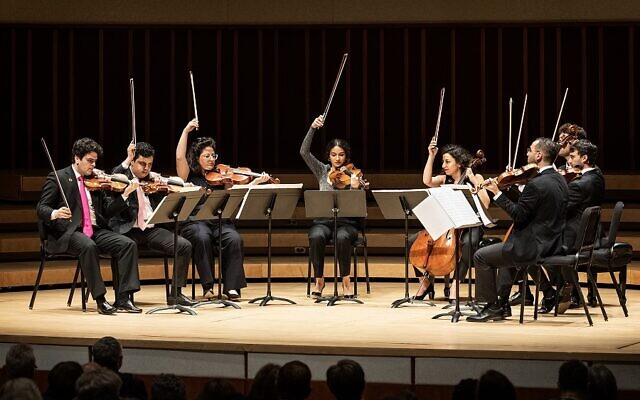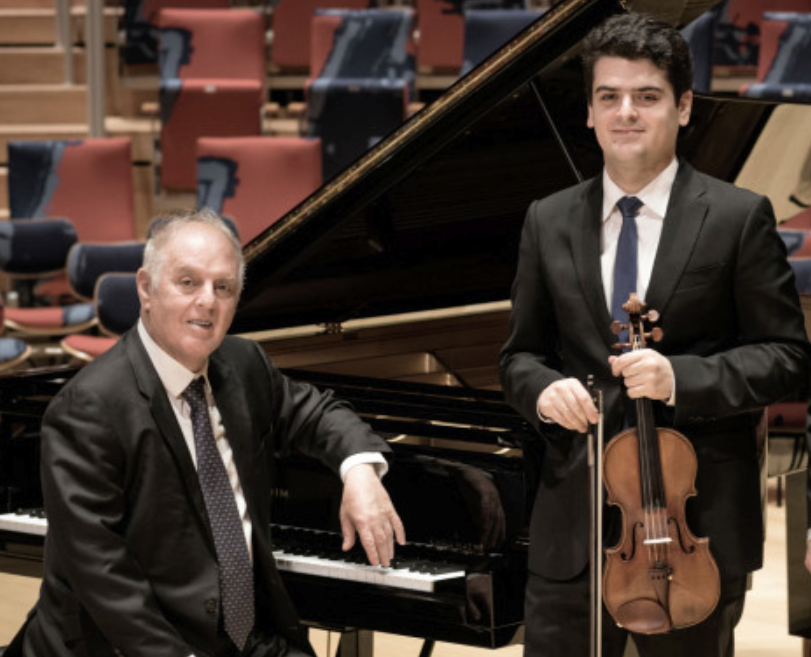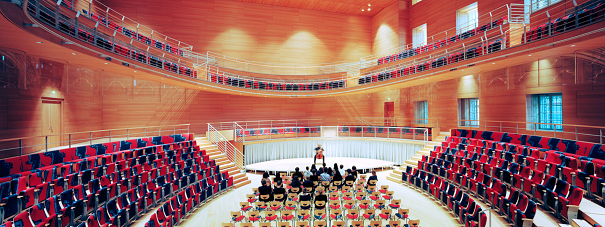Barenboim Brings Israeli, Arab Musicians Together
Michael Barenboim’s West-Eastern Divan Ensemble is composed of musicians who are graduates of a program that educates musicians from Israel and the Arab world.

A chamber music string ensemble, led by violinist Michael Barenboim, and composed of musicians from Israel and the Arab world, were featured in a concert at Emerson Hall at Emory University on March 2.
The group of eight players is an offshoot of the West-Eastern Divan Orchestra, which was founded 24 years ago by Barenboim’s father, the famed pianist and conductor, Daniel Barenboim, who was born in Argentina of parents who were survivors of the Holocaust. He immigrated to Israel when he was 10, but later moved to Germany where he now lives.
Michael Barenboim came of age under his father’s watchful guidance. He joined the orchestra at the age of 14 and became the concertmaster at 17. He has developed a successful career of his own as a soloist with orchestras such as the Israel Philharmonic, the Chicago Symphony Orchestra and with the Berlin Philharmonic Orchestra, in the city where he now lives. For the 37-year-old son of the great musician, the small group ensemble has been a way to highlight not only his own skills as a musician, but the progress that has been made over the nearly quarter-century history of the West-Eastern Divan Orchestra.
“The people that play in this ensemble are really longtime members of the orchestra,” Barenboim said “So there’s a very common way of thinking about music and that unites us. So, we have a tendency to approach phrasing in the same way. We have a tendency to approach timing. Although they come from so many different places. But we all have the same way of thinking about the music.”

Over the years, the elder Barenboim has shaped the West-Eastern Divan Orchestra into a familiar presence on the European festival circuit and a successful experiment in the development of a cross-cultural dialogue. In addition to a number of Israeli and Palestinian musicians, the 100 member-orchestra hailed from Iran, Algeria, Egypt, Lebanon, Syria and Iraq. The group takes its name from a book of poems by great German writer, Johann Goethe, that was inspired by the Arab world.
The co-founder of the orchestra was Edward Said, who was born in Jerusalem to Christian Arab parents and spent his childhood in Egypt. He began his schooling in the United States as a teenager and, later, became a distinguished professor of comparative literature and cultural studies at Columbia University. He was a strident critic of the modern state of Israel, but his interest in music brought him together with the elder Barenboim and, together, they established a foundation.
Said died in 2003 but his widow carries on the foundation along with the Barenboim’s. Although it has had strong philanthropic support from many international sources, Michael Barenboim believes its accomplishments go beyond politics.
“Nobody is naive enough to think that the orchestra would influence the political situation in so far as to make it any better. What we can do is…offer an alternative model of thinking and accepting for the Middle Eastern region that is not based on violence.
“It is based on understanding, on dialog and listening to the other. And I think we show people that this is actually possible.”

If politically the Barenboim-Said project has had limited political impact, its educational program is thriving. Since 2016, the Barenboim-Said Akademie in Berlin has offered a four-year bachelor’s program in music and the humanities.
There are about 85 students currently enrolled in the program, including a number from Israel and four Palestinians from Ramallah on the West Bank. There are also students from the Arab countries of North Africa and the Middle East, all of whom were admitted after a rigorous audition process.
The school has classroom space, dormitories and a $35 million performance center designed at no cost by the prominent American architect Frank Gehry. The German government contributed almost $25 million of the construction budget. Michael Barenboim is the provost at the school and teaches in the chamber music and violin programs. The school, he says, is planning to expand its offerings, to include a master’s program in music.
The chamber ensemble at Emory performed a program of modern chamber music by Ravel, Enescu, and Dvorak. It included a short piece by Paul Hindemith entitled, “Trauermusik,” or “Mourning Music.” It was written in 1936 in memory of Britain’s King George V, who died during Hindemith’s visit to London.
In keeping with the group’s international origins, Michael Barenboim asked the audience at Emory to observe a period of silence after the performance of the work. It was in memory of the tens of thousands of Turkish and Syrian citizens who died during the recent earthquake.
- Arts and Culture
- Opinion
- Bob Bahr
- Michael Barenboim
- Emerson Hall at Emory University
- West-Eastern Divan Orchestra
- Daniel Barenboim
- Chicago Symphony Orchestra.
- Israel Philharmonic
- Berlin Philharmonic Orchestra
- Iran
- Algeria
- Egypt
- Lebanon
- Syria
- Iraq
- Edward Said
- Columbia University
- Frank Gehry
- holocaust
- Paul Hindemith



comments